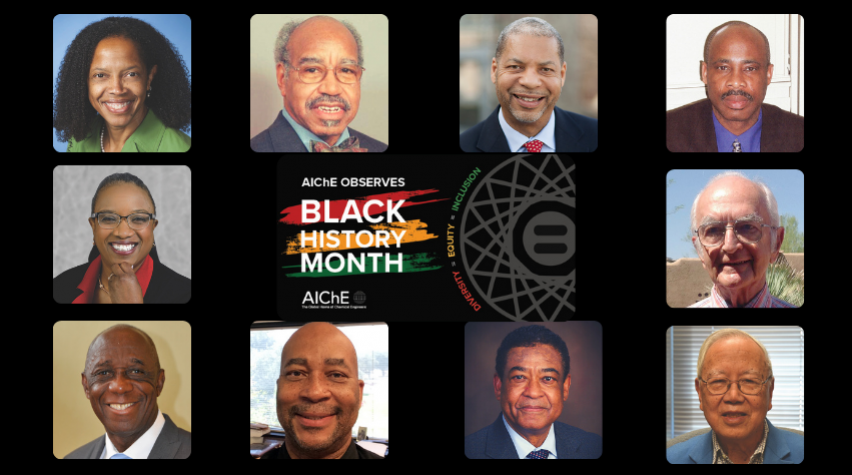
Above, a few of the pioneers who helped shape the direction of AIChE. Top row (left to right): Gilda Barabino, Henry Brown, Lance Collins, Emmanuel Dada. Middle row: Christine Grant, Gerald Lessells. Bottom row: Thomas Mensah, Irvin Osborne-Lee, Otis Shelton, James Wei.
In February, ChEnected observes Black History Month with posts about AIChE’s pioneers for equity and inclusion, as well as perspectives on the road ahead.
For more than 30 years, AIChE’s Minority Affairs Committee (MAC) has been dedicated to increasing the successful participation of underrepresented groups in chemical engineering and the Institute. In this post, ChEnected looks back at some of the milestones for MAC and AIChE.
The 1960s
1968: AIChE members and future directors Henry Brown and Gerald Lessells begin their work to raise the profile of minority engineers, forming a task force on minority youth career guidance. AIChE was the first engineering society to adopt a program addressing this need.
The 1970s
1970: The task force collaborates with AIChE’s Career Guidance Committee to produce and distribute training materials to AIChE local sections, with recommendations on how members could support disadvantaged youth in the community.
1976: Based on a proposal by AIChE director Gerald Lessells, the Institute establishes a Minority Affairs Coordinator position. This outreach role was filled by Lessells until 1983, and subsequently by Henry Brown.
The 1980s
1988: The advocacy of AIChE president James Wei provided for the establishment of a standing Minority Affairs Committee.
The 1990s
1990: The Minority Affairs Committee (MAC) is chartered, with Irvin Osborne-Lee as its first chair.
1994: MAC launches two annual scholarship programs — one for university engineering students and one for incoming college freshmen. Administered for most of its history by Emmanuel Dada, the program has provided up to fifteen $1,000 scholarships per year in each category, and has served nearly 500 students.
1995: AIChE members Gilda Barabino and Lance Collins establish the Minority Faculty Forum, a group that mentors chemical engineering faculty along their academic career paths. The forum continues to assemble at each year’s AIChE Annual Meeting.
1995: MAC establishes its William W. Grimes Award, named for AIChE’s first African American Fellow (elected in 1982).
The 2000s
2000: MAC collaborates with AIChE’s Women’s Initiatives Committee (WIC) on a joint mentoring program.
2009: MAC leaders, including Thomas Mensah and Emmanuel Dada, create the Eminent Chemical Engineers’ Forum, a symposium with invited honoree speakers held in connection with the AIChE Annual Meeting.
2012: MAC establishes the Janice Lumpkin Travel Grants to assist young faculty participation at the Annual Meeting.
2014: Otis Shelton serves as AIChE’s first African American president.
2015: The Minority Affairs Committee marks its 25th anniversary with a celebration at the AIChE Annual Meeting. The occasion was commemorated by the publication of a book about the history of MAC, the presentation of Pioneers of Engineering awards, and other projects.
2017: The AIChE Foundation establishes a new endowment to support the existing minority scholarship program: The Henry T. and Melinda C. Brown Endowment for the Education of Underrepresented Minority Chemical Engineers.
2017: MAC offers travel grants for students from minority serving institutions and historically Black colleges and universities (HBCUs) to attend AIChE’s Annual Student Conference.
2020: Christine Grant is elected president-elect of AIChE. She is the first African American woman to hold the position.
Today
As it enters its fourth decade, the Minority Affairs Committee continues its progress, with leadership by a new generation of members and increased community engagement via the MAC Newsletter and visibility on social media.



Comments
I believe that the MAC has achieved tremendous success since its inception 30 years ago and the participation by illustrious Fellows of AIChE with other input by other minority group as the Latinos. The young members would require mentoring by the seniors in paving the way in establishing themselves in the profession. The inclusion of other minorities as Indians and others should enhance the MAC in the future. Collaborations and networking among these groups are essential in forging a stable future for MAC.